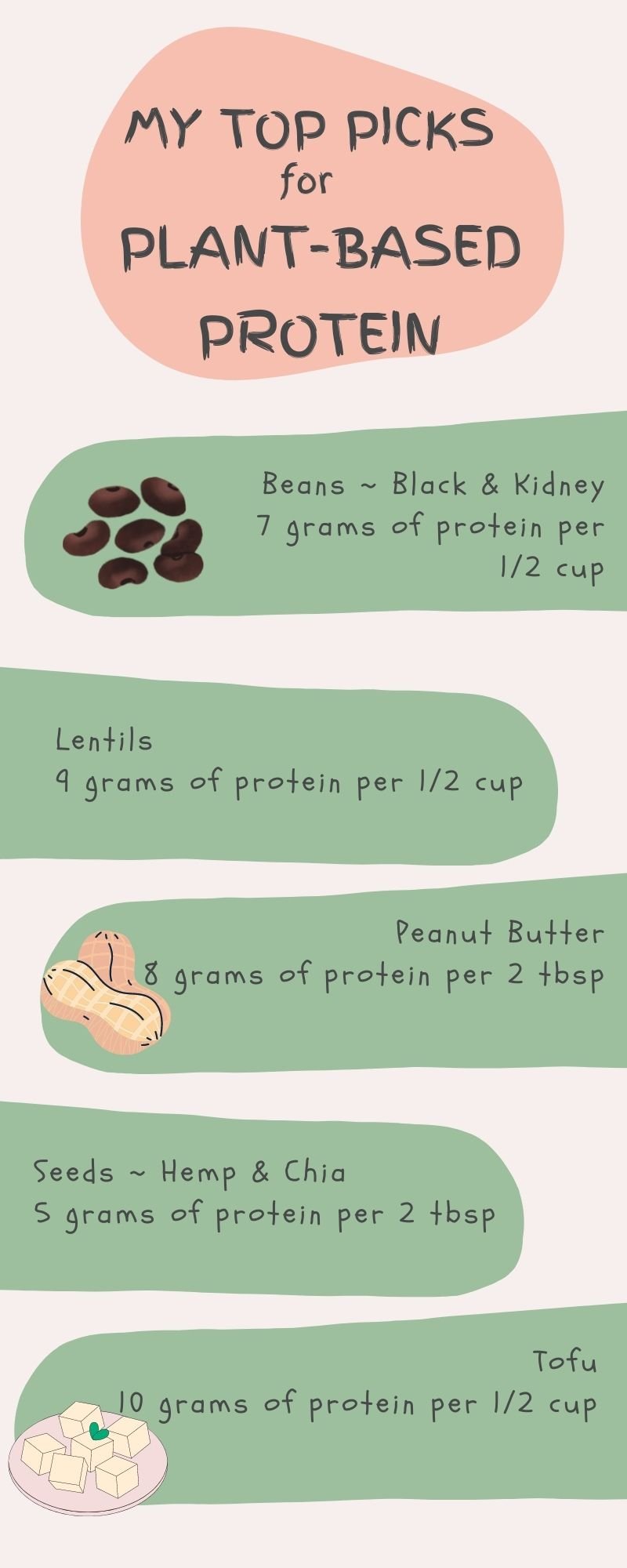But where do you get your protein?!
When I tell people that I follow a plant-based diet or that I am vegan, almost 100% of the time, the first thing they ask me is “Where do you get your protein?!”
Western-style diets focus on protein coming from animal sources. According to Brenda Davis, in countries like North America, Australia and Europe 2/3 of the protein intake comes from animals and only 1/3 from plants. When most people think of protein, they think about meat and dairy products. They assume that when you don’t eat these foods, you must be protein deficient.
Protein is a very important macronutrient, consisting of combinations of 22 amino acids or the “building blocks” of protein . It helps build and repair body tissue and it’s important for growth and development in children. Eating protein at each meal also keeps you feeling full for longer, therefore it plays a big part in weight maintenance.
But what most people don’t know is that we don’t need as much protein as you might think and protein deficiency is almost unheard of, unless you are suffering from a calorie deficit.
How much protein do you need?
Health Canada’s website states that:
There is no % Daily Value (% DV) for protein in the Nutrition Facts table. This is because most people get enough protein, so it is not a health concern for Canadians who eat a mixed diet.
In Staying Healthy with Nutrition (2006), Dr Haas, stated that the recommended dietary allowance for protein per kilogram of body weight is 0.8 grams.
If you are physically active, you’ll want to aim for 35% of your calories coming from protein and only 20-25% if you are sedentary.
All plants contain protein! So if you eat a wide variety of plant-based foods you will likely get enough protein. You will also be getting fibre, vitamins, minerals and antioxidants without the saturated fat and cholesterol that comes with eating animal protein.
Over 60 years old?
If you are over 60 years of age, it’s important to know that your body’s ability to use protein may become less efficient. You may want to think about increasing your daily protein to about 1g/kg of body weight (Davis, B., 2014).
Canada’s Food Guide
In January 2019, Canada released a new food guide. This guide eliminated the previous meat and dairy sections and combined them to create a protein section which includes and promotes plant-based sources of protein. This is a good sign for our health and the environment!
Protein Powder
If you need a quick protein option for post-workout recovery, a protein powder supplement can be beneficial.
However, it's crucial to understand the differences between various protein powders, as not all are equally nutritious. Many contain unhealthy additives like artificial colours, fructose, hydrolyzed protein, and artificial sweeteners, which can takeaway from their overall healthfulness.
Protein powders are made from a range of food sources, such as dairy, rice, eggs, milk, peas, hemp, and soy. Some formulations go beyond basic protein, serving as meal replacements fortified with greens, fibre, vitamins, minerals, additional fats, and grains.
Plant-based protein powders usually blend various sources like brown rice, pumpkin, pea, and hemp. Combining brown rice with pea or hemp protein creates a complete protein source, containing essential and branched-chain amino acids.
Hemp Protein Powder
Hemp is a great plant-based protein source because it provides a complete amino acid profile on its own. Hemps seeds also have a balanced ratio of omega 3 and 6.
Pumpkin Protein Powder
Pumpkin seed powder contains 18 amino acids. as well as tryptophan, zinc, vitamin K, iron, omega 6, copper and magnesium.
Pea Protein
If you are a plant-based athlete, pea protein contains an ideal combination of essential amino acids for optimal performance.
Brown Rice Protein
Brown rice only contains a small amount of protein so it should be paired with other plant-based proteins such as hemp or pea to complete the essential amino acid profile. It’s hypo-allergenic and easily digested so it’s a good option for those with a sensitive stomach or allergies.
Can you eat too much protein?
Yes! Research has shown that excessive protein intake, particularly from animal sources, can cause various health risks including heart disease, osteoporosis, stroke, kidney stones, and elevated levels of ammonium in the female reproductive tract, potentially leading to fertility issues. An excess of protein can also contribute to mild dehydration as the kidneys work overtime to eliminate the surplus protein and nitrogen waste. Digestive discomfort like indigestion and nausea can also occur.
With the rising popularity of low-carb diets, individuals may end up consuming excessive protein leaving them feeling worse without understanding why.
References:
Davis, Brenda, 1959-. (2014). Becoming vegan : the complete reference to plant-based nutrition. Summertown, Tennessee :Book Publishing Company.
Haas, E. M. (2006). Staying Healthy with Nutrition: The Complete Guide to Diet and Nutritional Medicine.


